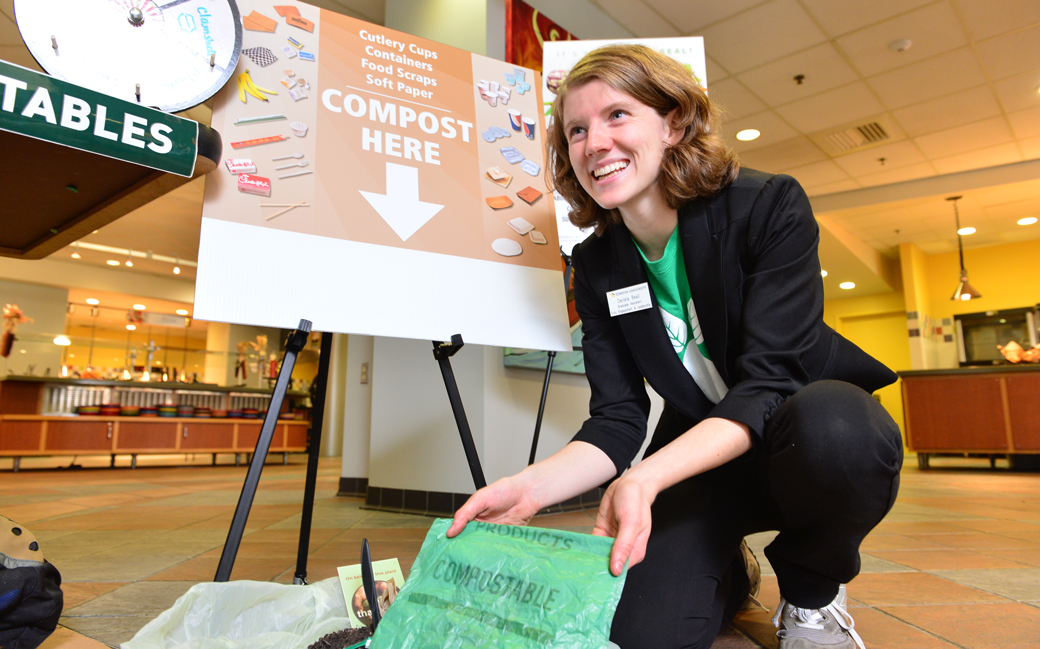
Towson joins EcoLeader program
Towson University is one of the first campuses to join the National Wildlife Federation EcoLeaders Program to help further assist the next generation of conservation and sustainability leaders.
The NWF EcoLeader program is an online community that allows the next generation of conservation leaders to access resources to get campus projects started and network with other students.
“The EcoLeaders program is an online platform for exploring environmentally related careers and launching and sharing environmental projects,” said graduate assistant for the environmental initiatives department Daniela Beall. “This program will help foster and support students who are interested in leading an environmental project.”
Beall was invited to participate in a NWF working group in the fall of 2016 to help develop their “campus partner” package. Soon after the package was fully developed, TU was invited by the NWF to be one of the first campus partners.
EcoLeaders is a resource for students to expand their involvement with environmental projects within the campus and around the nation.
“Students, faculty and staff at Towson have free access to EcoLeader career planning tools, and free registration to the annual EcoCareers conference, that would otherwise have a fee associated,” said Courtney Meadows, a TU Eco-Rep program member. “They also get a 50 percent [$15] discount on a EcoLeader Certification by leading a personal environmental project with help from EcoLeaders, it is a great experience and resume builder to have. While EcoLeaders is all about the environment, it deals with all aspects of it, allowing a student to focus on the area they care about.”
Students are responsible for developing projects within the EcoLeaders program. Students can input their ideas and work towards the environmental issue they truly want to help with.
“The Office of Civic Engagement & Social Responsibility and the Office of Sustainability are happy to work with students to help them succeed with their projects/initiatives,” Beall said. “The Office of Civic Engagement & Social Responsibility will host its third annual Retreat for Environmental Action next fall, which serves as a launchpad for student-led projects.”
Beall also helped to start Eco-Reps when she was an undergraduate. Eco-Reps are a group of student peer-educators who work towards promoting sustainability on campus.
“Eco-Reps work to share their enthusiasm and appreciation for the environment by educating the TU community about sustainability practices,” Meadows said. “The goal is to develop a culture of sustainability on campus where students, faculty and staff understand, practice and celebrate sustainable values in ways that transfer into their communities beyond TU.”
The Eco-Reps program holds a number of activities throughout the year and try to get students, staff, and faculty involved with furthering campus conservation and sustainability.
This fall, Eco-Reps got involved with the Project Green Challenge, a national effort to help make students be more aware of their environmental impact.
In addition, every spring, Eco-Reps participate in RecycleMania, a national recycling competition intended to raise awareness about waste reduction and to promote recycling.
“We also bring nationwide projects to Towson and try to get students involved in them,” Meadows said. “Through all this they can learn about how their daily behavior is affecting the environment and how they can do little things to help the environment.”
Various student organizations at TU are working to promote environmental awareness and conservation efforts so that students can play an active role in making TU a green campus.
“One of the main reasons that many people aren’t doing more for the environment is that they don’t realize the importance and effects their behaviors have,” Meadows said. “By increasing student awareness, we can improve in sustainability areas that rely on the students’ part, like recycling, composting, reducing waste production, etc.”
“We might even be able to reach beyond, by creating an environmentally conscious student body more big scale “green” projects can be put underway if the students support it.”

